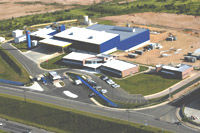Oil-eating bacteria may determine environmental impact of Gulf oil
Advertisement
The environmental impact of millions of gallons of oil still in the Gulf of Mexico from the Deepwater Horizon incident may depend on microscopic helpers: bacteria that consume oil and other hydrocarbons and could break down the spilled crude, making it disappear. That's the topic of an article in the current issue of Chemical & Engineering News (C&EN).
It points out that the oil-eating bacteria are beneficial in helping to clear away the oil. Their activity, however, could eventually pose risks to the Gulf's ecosystem, particularly in the deep ocean. The oil acts as a huge source of food and could produce bacteria "blooms," or massive population explosions. As the blooms die and decay, they remove oxygen from the Gulf water, jeopardizing the health of fish and other aquatic animals.
The article discusses scientific research underway to shed light on the bacteria's effects. It notes that the oxygen depletion so far is not as serious as the Gulf of Mexico's infamous "dead zone," an 8,000 square mile area — about the size of New Jersey — with oxygen levels too low for fish to survive. The Gulf's oil plumes cause nearly a 35 percent oxygen drop compared to a 90 percent drop in that dead zone.
Most read news
Organizations
Other news from the department science

Get the chemical industry in your inbox
By submitting this form you agree that LUMITOS AG will send you the newsletter(s) selected above by email. Your data will not be passed on to third parties. Your data will be stored and processed in accordance with our data protection regulations. LUMITOS may contact you by email for the purpose of advertising or market and opinion surveys. You can revoke your consent at any time without giving reasons to LUMITOS AG, Ernst-Augustin-Str. 2, 12489 Berlin, Germany or by e-mail at revoke@lumitos.com with effect for the future. In addition, each email contains a link to unsubscribe from the corresponding newsletter.




























































